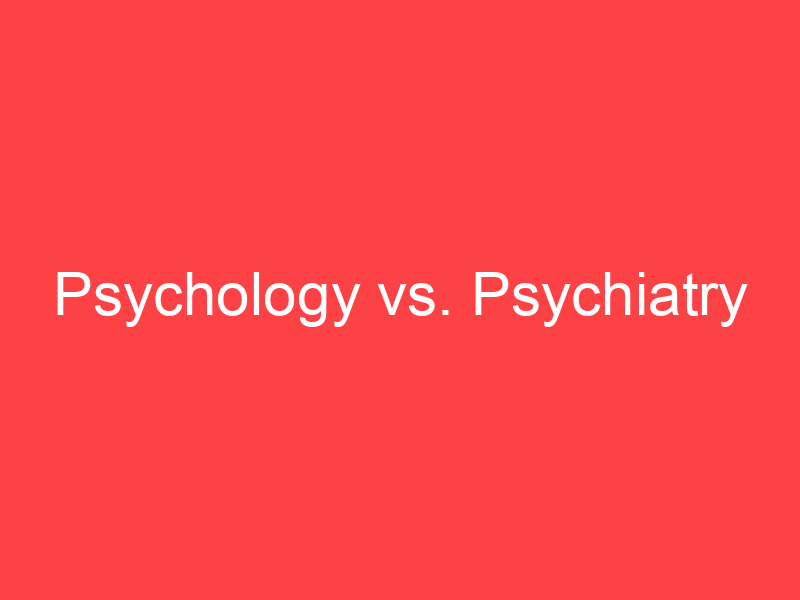Main Difference
The main difference between Psychology and Psychiatry is that the Psychology is a study of mental functions and behaviours and Psychiatry is a branch of medicine devoted to the study, diagnosis, treatment, and prevention, of mental disorders
-
Psychology
Psychology is the science of behavior and mind, including conscious and unconscious phenomena, as well as thought. It is an academic discipline of immense scope and diverse interests that, when taken together, seek an understanding of the emergent properties of brains, and all the variety of epiphenomena they manifest. As a social science it aims to understand individuals and groups by establishing general principles and researching specific cases.
In this field, a professional practitioner or researcher is called a psychologist and can be classified as a social, behavioral, or cognitive scientist. Psychologists attempt to understand the role of mental functions in individual and social behavior, while also exploring the physiological and biological processes that underlie cognitive functions and behaviors.
Psychologists explore behavior and mental processes, including perception, cognition, attention, emotion (affect), intelligence, phenomenology, motivation (conation), brain functioning, and personality. This extends to interaction between people, such as interpersonal relationships, including psychological resilience, family resilience, and other areas. Psychologists of diverse orientations also consider the unconscious mind. Psychologists employ empirical methods to infer causal and correlational relationships between psychosocial variables. In addition, or in opposition, to employing empirical and deductive methods, some—especially clinical and counseling psychologists—at times rely upon symbolic interpretation and other inductive techniques. Psychology has been described as a “hub science”, with psychological findings linking to research and perspectives from the social sciences, natural sciences, medicine, humanities, and philosophy.
While psychological knowledge is often applied to the assessment and treatment of mental health problems, it is also directed towards understanding and solving problems in several spheres of human activity. By many accounts psychology ultimately aims to benefit society. The majority of psychologists are involved in some kind of therapeutic role, practicing in clinical, counseling, or school settings. Many do scientific research on a wide range of topics related to mental processes and behavior, and typically work in university psychology departments or teach in other academic settings (e.g., medical schools, hospitals). Some are employed in industrial and organizational settings, or in other areas such as human development and aging, sports, health, and the media, as well as in forensic investigation and other aspects of law.
-
Psychiatry
Psychiatry is the medical specialty devoted to the diagnosis, prevention, and treatment of mental disorders. These include various maladaptations related to mood, behaviour, cognition, and perceptions. See glossary of psychiatry.
Initial psychiatric assessment of a person typically begins with a case history and mental status examination. Physical examinations and psychological tests may be conducted. On occasion, neuroimaging or other neurophysiological techniques are used. Mental disorders are often diagnosed in accordance with clinical concepts listed in diagnostic manuals such as the International Classification of Diseases (ICD), edited and used by the World Health Organization (WHO) and the widely used Diagnostic and Statistical Manual of Mental Disorders (DSM), published by the American Psychiatric Association (APA). The fifth edition of the DSM (DSM-5) was published in 2013 which re-organized the larger categories of various diseases and expanded upon the previous edition to include information/insights that are consistent with current research.The combined treatment of psychiatric medication and psychotherapy has become the most common mode of psychiatric treatment in current practice, but contemporary practice also includes a wide variety of other modalities, e.g., assertive community treatment, community reinforcement, and supported employment. Treatment may be delivered on an inpatient or outpatient basis, depending on the severity of functional impairment or on other aspects of the disorder in question. An inpatient may be treated in a psychiatric hospital. Research and treatment within psychiatry as a whole are conducted on an interdisciplinary basis with other professionals, such as epidemiologists, nurses, or psychologists.
-
Psychology (noun)
The study of the human mind.
-
Psychology (noun)
The study of human behavior.
-
Psychology (noun)
The study of animal behavior.
-
Psychology (noun)
The mental, emotional, and behavioral characteristics pertaining to a specified person, group, or activity.
-
Psychiatry (noun)
The branch of medicine that subjectively diagnoses, treats, and studies mental disorders and behavioural conditions.

